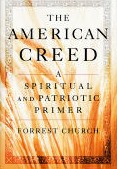bookshelf |
November/December 2002 |
|
Book To Noteby Tom Stites
The "American creed" is in the Declaration of Independence: "We hold these truths to be self-evident, that all men are created equal, that they are endowed by their Creator with certain unalienable Rights, that among these are Life, Liberty, and the pursuit of Happiness." Church measures our nation's deeds against these words. He writes that the Declaration of Independence placed "human law on a higher moral pediment. . . . The transcendent point of reference was no longer the sovereign but the people themselves, whose rights are endowed with divine authority." That sense of divine authority fueled the nation's struggle to bring full personhood to the people the Constitution excluded — "the unfinished campaign to tune the nation's history to the key of its ideals," Church calls it. Indeed, in his address to the March on Washington in 1963, the Rev. Dr. Martin Luther King Jr. said, "I have a dream that one day this nation will rise up and live out the true meaning of its creed: 'We hold these truths to be self-evident. . . .'" But this same sense of divine authority also provides the basis for the pernicious myth that God is uniquely on our side. "If patriotism is the last refuge of scoundrels," Church writes, "patriotism trussed up with God's mantle is potentially diabolical. . . . The civil religious spirit . . . can promote self-delusion and national arrogance. Or, it can vitalize the nation, directing its might to secure our nation's integrity." This book will help us work toward the latter. Tom Stites is editor of UU World.
| ||
Copyright © 2002 Unitarian Universalist Association | Privacy Policy | Contact Us | Search Our Site | Site Map
Last updated November 21, 2002. Visited times since November 6, 2002.
